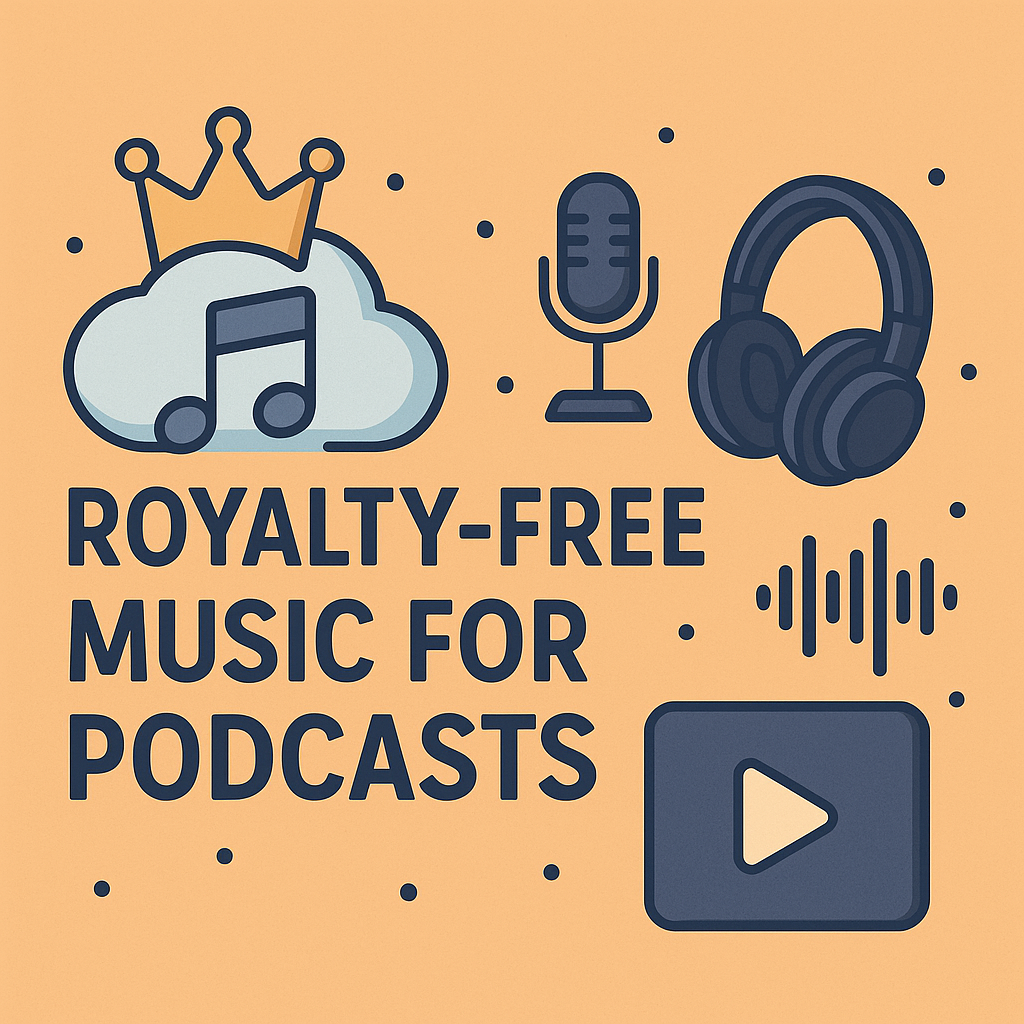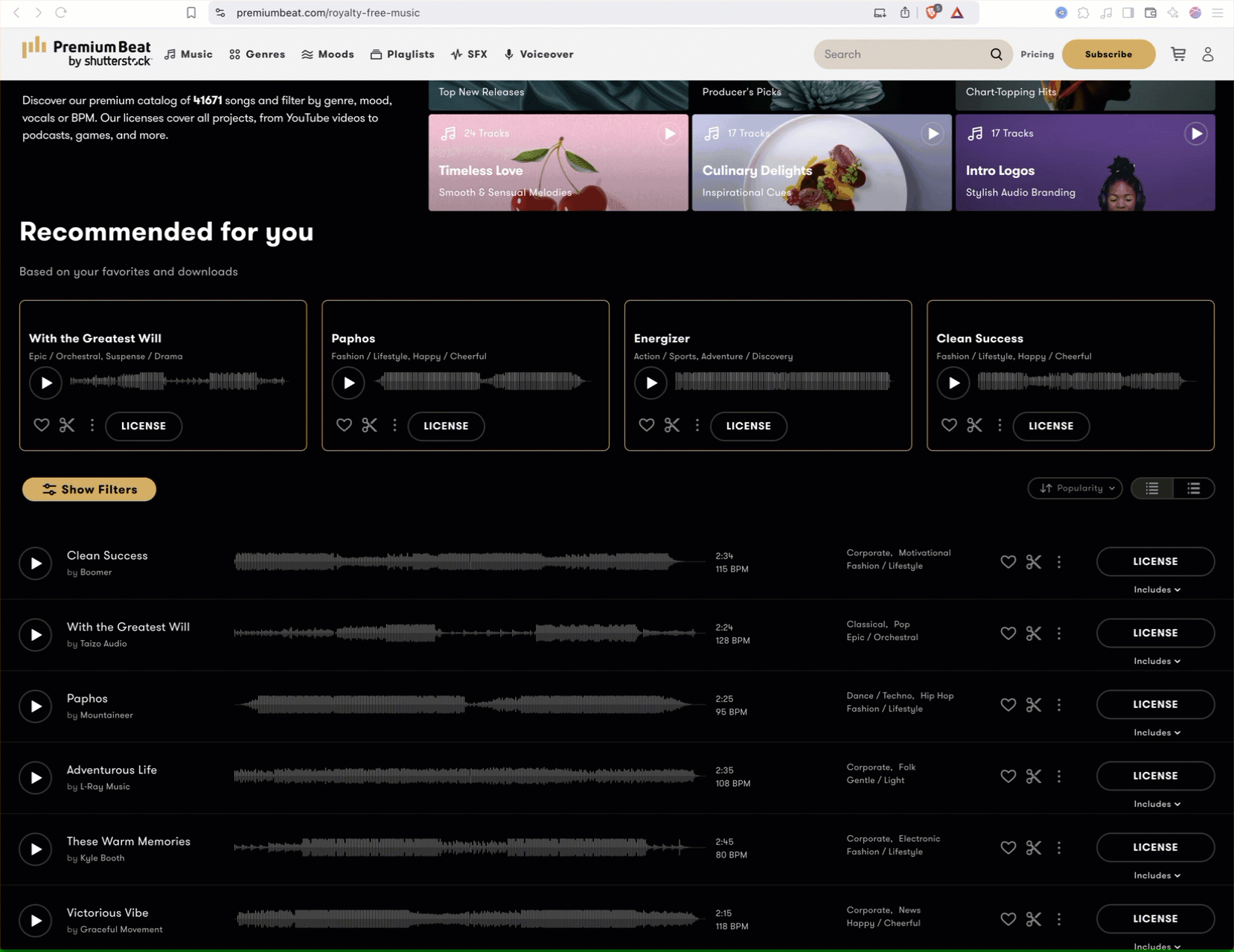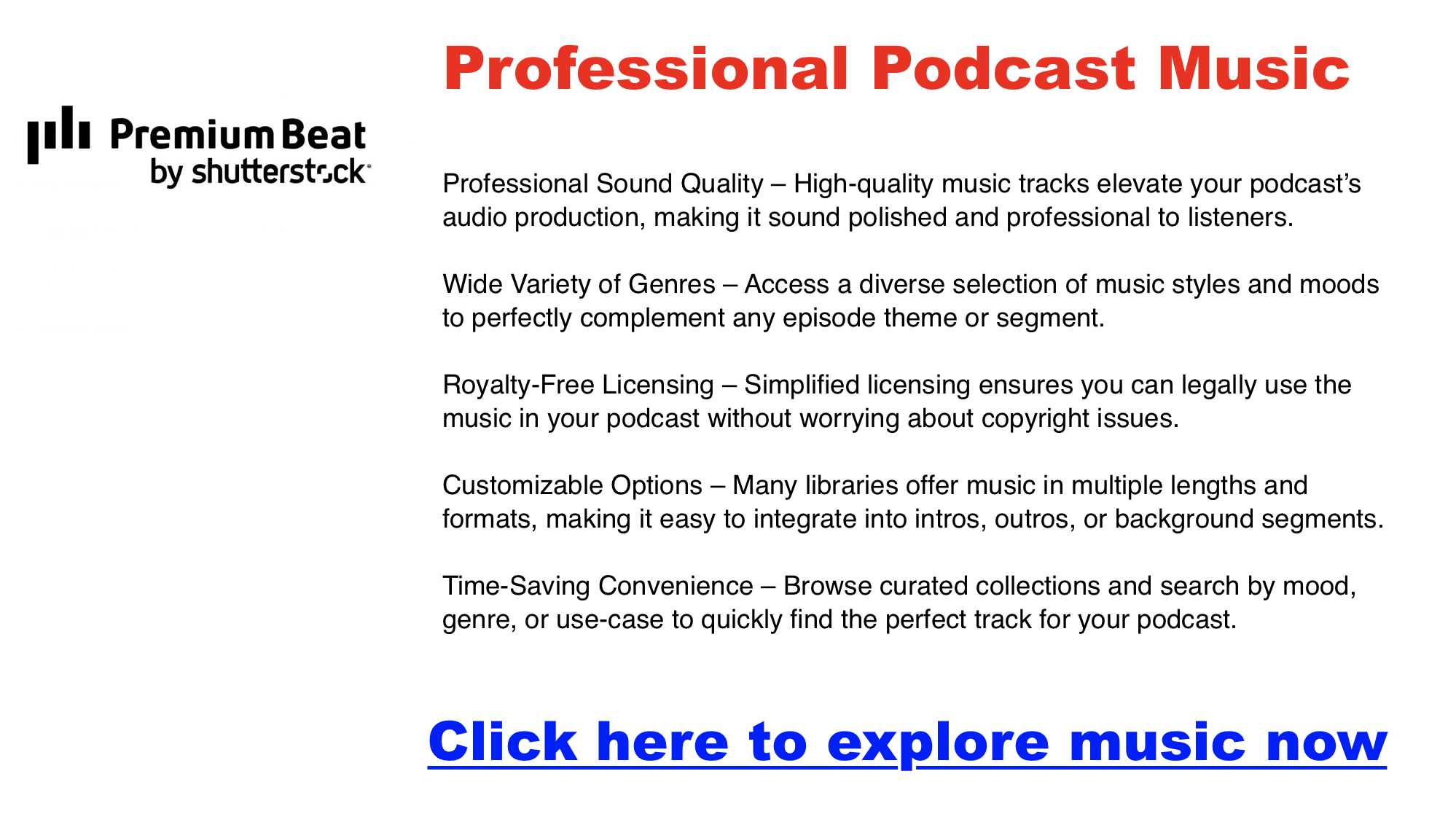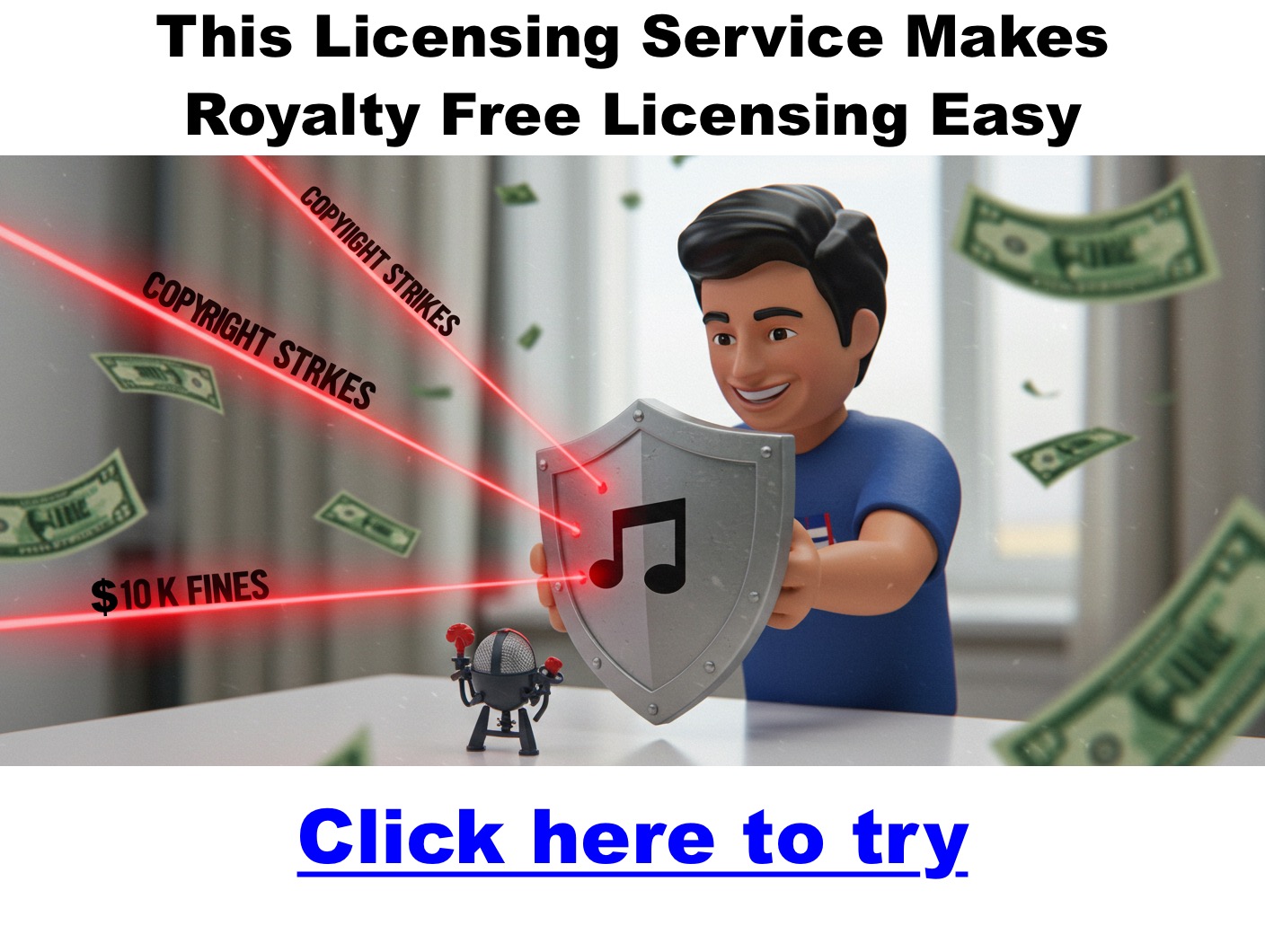Royalty-Free Music for Podcasts: Music Rights & Licensing for Beginners

Can you play any music you’d like on a podcast? The quick answer is no. You cannot play ‘any’ music you’d like on a podcast because it depends on the type of licensing that may (or may not) be attached to it. Safe to say, popular songs tend to require extensive licensing procedures that can cost thousands of dollars for seconds of play. In fact, we have a great little cheat sheet on music rights too.
Other songs might be royalty-free for personal use but require attribution or a small fee for commercial use, this article explores the intricacies of music licensing and shows you how to use copyrighted music in a podcast.
Podcast Music License Types
Making sure you properly license music for your podcast is a must. Not only does it protect you from copyright claims and potential legal trouble, but it also ensures you’re free to use the tracks without worry. Using unlicensed music might seem tempting, but it can lead to serious issues—your podcast could be taken down, you might face hefty fines, or even lawsuits. Platforms like Spotify and Apple Podcasts are strict about unlicensed content, which could hurt your credibility and limit your reach. By licensing your music the right way, you keep your podcast professional, compliant, and worry-free.
Here are some common licensing options to be aware of:
- Royalty-Free Music for Podcasts:
- Royalty-free podcast music is a licensing model that allows podcasters to pay a one-time fee for unlimited usage of a track, avoiding ongoing royalty payments each time the music is used. This is generally one of the best ways to license music for a podcast that needs high-quality music without the long-term costs or complications of traditional music licensing. It is a cost-effective and hassle-free solution for enhancing a podcast, and I would consider looking at their options first. Click here to learn more.
- Fair Use:
- Fair use is a complex area of law determined by the specific nature of the use, the amount of material used, and its impact on the original work’s market.
- Public Performance License:
- This license grants the right to perform a musical work in public, and in the context of podcasts, this includes broadcasting to your audience.
- Synchronization License:
- If you wish to synchronize music with other media, such as your podcast content, you’ll need this license to legally combine audio and visual elements.
- Mechanical License:
- This license is essential if you plan to reproduce copyrighted music in your podcast, whether by copying, distributing, or selling it.
- Master Use License:
- If you want to use a specific recording of a song in your podcast, you’ll need a master-use license to secure the rights to that particular version.
- Creative Commons music:
- Some artists release their music under Creative Commons licenses, which allow for use with certain conditions, such as attribution or non-commercial use. Search for music on platforms like SoundCloud or Free Music Archive.
- Original music:
- If you or someone you know is a musician, you can create original music for your podcast. This is a great way to have unique and personalized sound.
- Public domain music:
- Music that is in the public domain is free to use without any restrictions. This includes older works where the copyright has expired.
Royalty-Free Music for Podcasts
Grab Podcast-Ready Music Tracks That Hook Your Listeners—Click Now
Royalty-free music libraries offer various tracks spanning various genres and moods, often available for a one-time fee or a subscription. These tracks are pre-cleared for podcasts, meaning you can use them without the burden of copyright infringement worries. This ease of use allows you to focus on creating your podcast content without the stress of legal issues. Royalty-free is 9 times out of 10 the easiest and cheapest way to license music.
Perks of Using Royalty-Free Music for a Podcast
- Cost-Effective: Royalty-free is usually more affordable than licensing popular tracks, making it accessible for podcasters with limited budgets.
- Avoid Legal Issues: Using copyrighted music without licensing permission can lead to legal trouble, including takedowns or fines. Royalty-free music eliminates this risk as it’s legally cleared for use on a podcast.
- Creative Freedom: With various styles and genres, royalty-free music allows podcasters to find the perfect track that matches their brand and content tone.
- No Ongoing Payments: Once purchased or acquired, royalty-free music is a one-time cost, with no additional fees for continued use.
- Commercial Use: Many royalty-free music licenses allow commercial use, meaning podcasters can monetize their episodes without worrying about additional music costs. Always double-check the license to ensure that this is the case, as each song can have different rights.
- Global Rights: Royalty-free music can often be used worldwide, so podcasters don’t have to worry about geographical restrictions when distributing content across different platforms.
- Time-Saving: It’s easy to find and purchase royalty-free tracks online, speeding up the production process without negotiating individual licensing terms. There are entire libraries of royalty-free options from different providers.
- Flexible Licensing: Royalty-free music usually comes with flexible licensing terms that allow for usage across multiple episodes or podcasts without needing to re-license.
- Customization: Many royalty-free tracks are available in different lengths and edits, making them easier to fit into various podcast segments like intros, outros, and transitions.
- Freedom to Distribute: Podcasters can distribute their episodes freely on platforms like Apple Podcasts, Spotify, or YouTube without worrying about content ID claims or takedowns due to music licensing issues.

Unlock Legal, High-Quality Music Instantly—Click Here to License Now!
Uses for Royalty-Free Music
Click Here to Discover Affordable, High-Quality Music for Your Podcast
- Intro Music: Set the tone for your podcast from the start with an attention-grabbing, branded piece of music that plays at the beginning of each episode.
- Outro Music: Use music to close your episodes with a consistent sign-off that leaves a lasting impression on listeners.
- Transition/Segment Music: Royalty-free music can separate different segments or topics within an episode, providing smooth transitions that keep the flow engaging.
- Background Music: Subtle music added underneath voiceovers or discussions can enhance the mood, create atmosphere, and help maintain listener engagement.
- Ad Breaks: For podcasters who include sponsored segments or ads, music can introduce and close these breaks, distinguishing them from the main content.
- Special Episodes or Themes: Music can help differentiate special episodes, such as holiday editions, interviews, or bonus content, by matching the theme or mood of the episode.
- Bumper Music: Short clips of music (bumpers) can be used before or after important announcements, call-to-actions (like asking for reviews), or when introducing a guest.
- Sound Effects: Royalty-free music can include sound effects that enhance storytelling or create emphasis during particular moments in the podcast.
- Podcast Trailer/Teasers: To build excitement and anticipation, use music to create promotional content, such as trailers or teasers for upcoming episodes.
- Live Event Recordings: If a podcast episode is recorded live, music can be used during breaks, audience applause moments, or even as an energetic lead-up to the live recording.
- Narrative Enhancement: Music can underscore important moments, build tension, or convey emotions in podcasts that involve storytelling or scripted content.
6 Best Royalty-Free Podcast Music Providers
| Provider | Features | Pros | Cons | Pricing |
|---|---|---|---|---|
| Artlist | Extensive library, advanced filtering, music & SFX, stock footage, templates | Large, high-quality music library; unlimited usage; flexible pricing options | No free plan; subscription required; relatively high price | $14.99/month (Social), $16.58/month (Pro), $39.99/month (Max) |
| Bensound | Single creator, wide genre variety, free with attribution or paid licensing | Free option with attribution; affordable pricing for single tracks | Limited variety (single creator); widely used tracks | Free with attribution, $34 per track, $9.99/month (Standard), $19.99/month (Extended), $39.99/month (Premium) |
| Soundstripe | 40,000 sound effects, customizable playlists, partner artists, curated music | Affordable plans; includes sound effects; customizable playlists | No free trial; limited music library compared to competitors | $19.99/month (Creator), $39.99/month (Pro), Custom pricing (Enterprise) |
| Pond5 | 500,000+ tracks, individual and bundle pricing, video footage & sound effects | Extensive music and media library; individual track purchases | Navigation can be cumbersome; premium tracks can be expensive | $5+ per track, $99.95+ for MusicPack bundles |
| YouTube Audio Library | Completely free, simple filtering by genre, mood, duration, artist | Free, easy to use, large selection of tracks | Tracks are widely used; lower quality compared to paid platforms | Free |
| PremiumBeat | Curated, studio-quality music, flexible licensing, curated playlists | High-quality tracks; professional curation; flexible licenses | Expensive for frequent single-track purchases | $39 per track (Creator), $59 per track (Standard), $199 per track (Premium), $999 per track (Business) |
Navigating the Music Licensing Process
- Identify the Right Holder:
- Determine who owns the rights to the music you intend to use. This may involve contacting the artist, record label, or music publisher.
- Select the Appropriate License:
- Depending on your intended use of the music, choose the relevant license(s) to ensure comprehensive coverage and compliance.
- Negotiate Terms and Fees:
- Engage in open communication with the rights holder to discuss terms, including fees and any specific conditions associated with the license.
- Document Everything:
- Keep detailed records of your licensing agreements, ensuring clarity on the scope of usage, duration, and any other pertinent details.
Fair Use Music Rights & Podcasting
Click Here to Access Studio-Quality Music Tracks for Your Podcast, Instantly
Fair podcast use, especially concerning music integration, demands a nuanced approach, balancing creative ambitions against copyright obligations. The doctrine of fair use allows for the limited use of copyrighted material without permission for specific purposes, such as criticism, commentary, or education. Still, its application is highly contextual and determined by four main factors: the purpose of use, the nature of the copyrighted work, the amount used, and its impact on the work’s market value.
A common misconception is that a safe amount of copyrighted material can be used under fair use; however, even small portions can constitute a substantial part of a work, particularly if it’s iconic. This highlights the importance of understanding that fair use is a defense against copyright infringement claims, not a preemptive right. Given the complexities and potential for significant legal repercussions, podcasters are advised to consult with intellectual property law experts to navigate the specifics of fair use.
To circumvent the uncertainties associated with fair use, podcasters can explore alternatives such as royalty-free music or licensed tracks from online platforms, providing clear terms of use and minimizing legal risks. This strategic approach allows creators to enhance their podcasts within legal frameworks, focusing on creativity and audience engagement while ensuring copyright compliance.
Best Practices for Music Licensing in Podcasts
Stay Informed on Licensing Options: Familiarize yourself with the various types of music licenses available. Public performance, synchronization, mechanical, and master use licenses serve different purposes, and understanding their nuances will empower you to make informed decisions about which licenses align with your podcasting needs.
Explore Royalty-Free Music: While licensing popular tracks from well-known artists can elevate your podcast, exploring royalty-free music is a cost-effective and straightforward alternative. Many platforms offer high-quality, royalty-free music that can enhance your content without the complexities and expenses associated with traditional licensing.
Utilize Licensing Platforms: Leverage licensing platforms that facilitate seamless transactions between creators and rights holders. These platforms streamline the negotiation process, clarify licensing terms, and provide a secure environment for obtaining the necessary permissions. This can be especially beneficial for podcasters seeking simplicity and transparency in the licensing process.
Keep Detailed Records: Establish a robust system for documenting your licensing agreements. This includes recording details such as the names of the songs, artists, and types of licenses obtained, usage restrictions, and any associated fees. These records not only serve as evidence of compliance but also assist in managing your licensed music library effectively.
Seek Professional Guidance: If you find yourself navigating unfamiliar terrain or facing complex licensing scenarios, seeking legal advice is a prudent step. Legal professionals specializing in intellectual property and music law can provide invaluable insights, helping you make sound decisions that align with both your creative vision and legal obligations.
Respect Copyright Duration: Understand the duration of copyright protection for the music you intend to use. Copyright laws vary, and compliance requires awareness of when specific works enter the public domain or when licensing agreements need renewal.
Engage with Independent Artists: Establishing relationships with independent artists can offer unique opportunities for podcasters. By directly collaborating with musicians, you may negotiate more flexible terms and contribute to the promotion of emerging talent, fostering a symbiotic relationship between podcasting and the music industry.
Practical Tips for Music Licensing in Podcasts
Elevate Your Podcast with Music That Captivates—Click Here Now
As podcasters dig into the world of music integration, mastering the art of seamless incorporation requires a nuanced approach.
Align Music with Your Podcast’s Identity: Choose music that complements the overall theme and tone of your podcast. Whether it’s a business podcast, a storytelling series, or a comedy show, the music should resonate with your audience and enhance the overall brand identity of your podcast.
Mindful Timing and Pacing: Consider the pacing and timing of your podcast episodes when incorporating music. Introduce music at strategic points to enhance emotional impact, such as during intros, outros, transitions, or key moments within the narrative. Pay attention to the natural rhythm of your content to ensure a seamless flow.
Match Intensity Levels: Harmonize the intensity of your music with the content it accompanies. If you’re discussing a high-energy topic, choose music that mirrors that intensity. Conversely, for more contemplative or serious subjects, opt for music with a softer touch to maintain a cohesive listening experience.
Avoid Overpowering Dialogue: Ensure that your music doesn’t overpower the spoken content. The primary focus should always be on the dialogue, with music serving as a supportive element. Adjust volume levels carefully to strike the right balance and prevent distractions from the main message.
Create Consistent Themes: Develop consistent themes or musical motifs that become associated with specific segments or recurring features in your podcast. This helps establish a recognizable and cohesive sonic identity, fostering a sense of familiarity for your audience.
Test and Gather Feedback: Before finalizing your music choices, conduct test listens and gather feedback from a diverse group of listeners. Understand how your chosen music resonates with different demographics and adjust accordingly. A small sample audience can provide valuable insights into the overall impact of your music integration.
Explore Instrumental Tracks: Instrumental tracks can be particularly versatile, offering music’s emotional depth without distracting lyrics. This can be especially effective when you want to underscore specific moments in your podcast without competing with spoken words.
Customize Music for Segments: Tailor your music choices to specific segments or recurring features within your podcast. Having signature tunes for different sections creates a sense of structure and can enhance the overall listening experience.
Update Music Regularly: Keep your podcast’s musical landscape fresh by periodically updating your licensed music library. This prevents listener fatigue and allows you to stay current with evolving trends and maintain a dynamic, engaging auditory experience.



